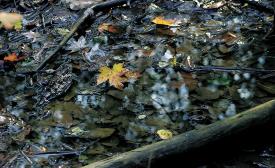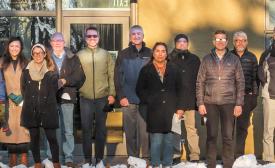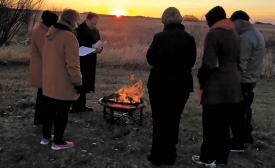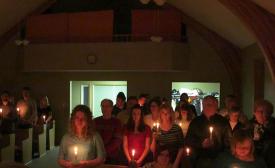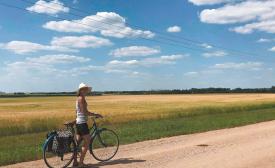Volume 26, Number 5
Two years in
Since March 2020, when the COVID-19 pandemic came into the lives of Canadians, this magazine has published many accounts of life in pandemic times. There have been reports on how Mennonite churches and organizations have adapted to health restrictions, found new ways to care for others, and even managed to have fun, despite the challenges.
‘Who are we as the church now?’
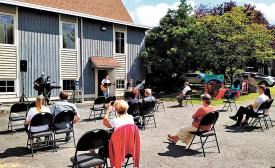
Following provincial protocols for meetings during the pandemic, members of Sherbrooke Mennonite Church in Vancouver gather for an outdoor service, in the summer of 2020. (Photo by Garry Janzen)
Justin Sun has never known pastoring other than during a pandemic. A year-and-a-half into his first pastorate, he says, “It’s been rough. How do I even do this job? I didn’t even attend a real in-person service until June.” That was nine months after he started in is job as a youth pastor in Richmond, B.C.
Readers write: March 7, 2022 issue
Thank you for sharing Janzen tribute
Re: “Simple wonder, peculiar generosity,” Jan. 24, page 4.
I recall meeting Annie Janzen for the first time at an event hosted at/by Canadian Mennonite Bible College in Winnipeg in the late ’60s or early ’70s.
Joining the Office of Fun
After four decades of ministry primarily focused on youth, young adults and young leaders, I welcomed the invitation to become the director of congregational ministries within Mennonite Church Manitoba.
Waldemar Janzen
At the 1970 Conference of Mennonites in Canada annual sessions in Winkler, Man., Waldemar Janzen, a Canadian Mennonite Bible College professor, gave a report on young people, stating: “Not everything is wrong with young people today. There is a great openness and honesty among youth today. There is a remarkable depth of insight into self and society.
Civil disobedience
I smiled seeing a friend post on Facebook, tongue firmly in cheek, that civil disobedience is fine as long as he agrees with the issue.
Reta-coloured lenses
I’m not sure what happened over the past two years. Maybe I finally accepted that it’s over. We’ve passed the point of no return. Climate change; democracy collapse; and the death of common sense, dialogue and civility. This is our reality and it seems beyond repair.
A prayerful reflection on the protests of February 2022
Lord, in your mercy, hear our prayer.
When tensions grow, positions harden, and hearts grow cold, we call for Canadians to pause, step back and reflect.
We see that (on Feb. 3) Ontario declared a state of emergency because of protests in cities, towns and border crossings. Across the country, leaders at all levels of government are struggling to respond to protests.
MC Canada issues call to eco-mission
Leaders of Mennonite Church Canada are calling on the members, congregations and regional churches of the nationwide church to respond to the climate emergency.
“We must act, we must act together, and we must act urgently,” write the executive ministers of Mennonite Church Canada, in a four-page document published on Feb. 7.
Defending peace, defending the climate
Leadership from 18 Anabaptist organizations in the United States and Canada convened at the Anabaptist Collaboration on Climate Change (ACCC) on Jan. 26 and 27 to address what many consider a moral emergency.
Food waste a resource for change
Humanity wastes 931 million tonnes of food each year. This figure—from the 2021 United Nations Environment Programme Food Waste Index Report—is an estimate with an admittedly wide margin of error, but it is probably the best of the wildly varying estimates of food waste in the media.
In praise of small churches
Throughout the pandemic, many Mennonite church congregations have faced the challenges of lower attendance, shrinking budgets and uneasy questions about the future.
Saskatoon cyclist encourages year-round active transit
Winter BYXE Week, an event designed to promote winter cycling in Saskatoon, was held from Feb. 14 to 21. Saskatoon residents were encouraged to try cycling for winter transportation, exercise and leisure.
For Stephanie Siemens, two-wheeled transit in the city is a year-round passion.












